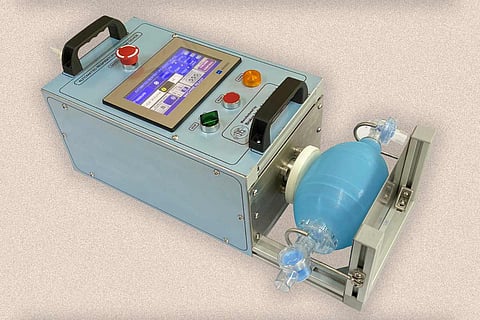

At a time when ventilators and respiratory assist devices are high priority due to the pandemic, an automated respiratory assist device has been developed in Tamil Nadu jointly by the TVS Group, the Sundaram Medical Foundation and the Indian Institute of Technology, Madras. The makers also say that it is a ‘cost-effective’ device, however, have not revealed how much it will be priced at yet.
The machine has been named Sundaram Ventago and will be manufactured locally. It is expected to bring down healthcare cost in addition to making respiratory support more affordable and available to all. The first batch comprising 25 units of device is currently under production at TVS Group firm, Brakes India, at Padi in Chennai. User training and support will be provided through a dedicated mobile application.
According to its website, the device is “designed for resource-stressed regions situations where the requirement for respiration support is higher than ventilator availability.” It is meant to be a bridge solution where a person does not have access to a ventilator.
Sundaram Ventago has been designed according to internationally accepted medical standards and in collaboration with the Madras Medical College, Kauvery Hospital and with guidance from MIT-Boston. It has a simple design comprising of three main assemblies - the actuator unit (which is responsible for moving and control of the machine), the electronic control module and the ambu-bag (a hand-held device for providing positive pressure ventilation to patients who are not breathing adequately) with patient airway circuit.
According to a release, the Sundaram Ventago works with or without compressed/hospital air and oxygen and requires only a standard power connection to operate, making it easy to be used in non-ICU wards, ambulances and in remote or rural areas.
Answering questions via email to TNM, Dr Jayaraj Joseph, Assistant Professor at the Department of Electrical Engineering, IIT Madras, who was part of the team that developed the device, explains that it is based on controlled and precise automation of the ambu-bag to provide respiratory assistance to the patient. “It provides volume controlled time-cycled ventilation with an overpressure limit. Importantly, it will also detect the patient’s breaths and provide assisted breaths,” he said.
He added that while the operating mechanism of the new device may differ from some of the high-end ventilators costing above Rs 3 Lakh, the new device has efficient control algorithms and alarms to ensure reliability and patient safety. “It constantly monitors and reports respiratory parameters that are important to clinicians and is very easy to use. It also provides the needed patient safety features such as audible alarms for line disconnection, or, in the case that the Peak Inspiratory Pressure (PIP) exceeds a certain threshold,” he explains.
According to him the device offers far greater precision than manual pumping, even with over 24-hours of continuous use.
This device can also be used in tandem with a standard Uninterrupted Power Supply (UPS) and mounted on a crash cart, wheelchair, bed, in an ambulance etc. to support a mobile patient and can be used as an emergency transport ventilator. Dr Jayaraj pointed out, “The device may be used in a hospital, in Intensive Care Units (ICU) or wards or Emergency Rooms (ER), and also during intra-hospital transport within a hospital, in lieu of the current manual bag and mask protocol. It can also be used in ambulances for inter-hospital transport.” However, in its current form, it is not meant for home use.
In a press release, Sriram Viji, Deputy Managing Director – Brakes India, TVS Group, remarked that the respiratory assist device is a ‘Make in India’ product with a local supply chain. “It can be produced quickly in larger numbers. The Sundaram Ventago will also have a great impact post-COVID as this device can make respiratory support more affordable and available to all,” he has said.
Concurring with Sriram’s thought, Dr Sridhar, Chief Intensivist at Kauvery Hospital, who was the senior medical advisor involved in developing the ventilator said, “Sundaram Ventago could help in the post-COVID world in the care of critically ill patients in ICU and during transport of patients both within the hospital and in between hospitals.”
Noting that about 80% of the country’s medical devices are imported, Dr S Aravindan, Executive Director of Kauvery Hospitals said, “Cost effective ventilators like this manufactured in India will significantly bring down the cost of healthcare”.